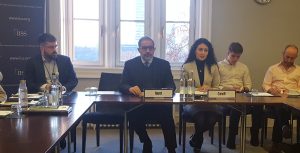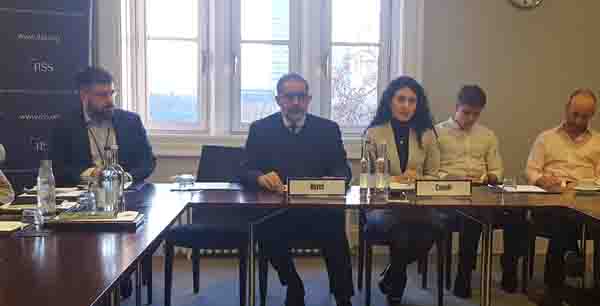By Sami Zaptia.

London, 16 December 2018:
Libyan Presidential election candidate, Aref Nayed, said that the international community should use the UN Charter’s Chapter VII powers to hold Libyan elections and that he would use force to confront Libya’s militias.
He added that he had never intended to be a politician but that he got involved in politics on the second day of Libya’s anti-Qaddafi 17 February 2011 revolution.
Nayed was speaking under the banner of “Libya’s prospects: is a political settlement achievable?” at the International Institute for Strategic Studies (IISS) in London on Friday.
Nayed said Libyans had high hopes of the 2011 uprising, but that eight years later they were now totally disappointed with the misery they have found themselves in.
Conditions have become so bad in Libya that people are now nostalgic for the security and stability of the Qaddafi era, he added.
Libya’s multi-faceted civil war and the resultant misery of the situation in Libya led to his desire to help rectify it and was one of the motivations for announcing his early candidacy for Libya’s presidential elections.
Total support for LPA
He stressed his total support for the 2015 Skhirat Libyan Political Agreement (LPA) and the efforts of UNSMIL head Ghassan Salame, and that there can be no military solution to Libya’s problems.
On the contrary, his problem with the LPA was that it was never fully implemented. For example, the Presidency Council was de facto single-man rule by Faiez Serraj. The PC was only supposed to last for a maximum of two years and it’s already in its third year, he pointed out.
Moreover, not only was the LPA not fully implemented to get Libya out of its stalemate but nor was the Paris agreement of May 2018, he lamented.
The failure to implement the Paris agreement to hold elections in December this year was another major failure by the international community to force the Libya issue forward.
Sabotage of elections
Beyond failing to implement agreements, Nayed was disappointed by efforts to actually sabotage efforts to hold elections.
He felt that it was quite a major achievement to get all of Libya’s major political figures to agree to an election timetable in the Paris agreement – yet it was sabotaged by many obstructors, including Italy.
Nayed said that one of the main reasons for announcing his early candidacy for Libya’s presidential elections was to stress the need for holding Libyan elections.
Nayed said that the Palermo Libya conference was “a mess” and all it achieved was a vague promise of a spring election.
Libyans are angry
Nayed warned that Libyans are now very angry and that there could be another uprising in 2019. He said that it was the corrupt Libyan political elite who are united in maintaining the status quo.
The way out: elections
Nayed said that the way out for Libya out of its current predicament was to implement the LPA “to the letter”. Libya needed to prepare to hold elections as soon as possible.
Use of Chapter VII of UN Charter
If the obstructionist political elite try to sabotage elections then the international community should use Chapter VII of the United Nation’s Charter to implement them.
Nayed said that if the international community were prepared to use Chapter VII to remove Qaddafi, then why not use it to ensure the holding of democratic elections.
He did not accept that security was the barrier to holding Libyan elections saying that security today was better than it was in 2014, when Libya’s last parliamentary elections were held.
He maintained that excuses not to hold elections were not acceptable, and that they were merely an excuse to maintain the status quo.
Militias
Responding to a question by Libya Herald about militias, Nayed agreed that it was imperative to do something about Libya’s weapons and militias. He said that the militias were a “monster” that has a wire plugged into the Central Bank of Libya (CBL).
He said that the CBL has the unique distinction of paying the salaries of those killing it and the country.
He added that an end had to be put to the fact that the CBL and Libya’s trade finance was being “controlled by a small clique”.
Asked by Libya Herald about his “carrots and sticks” policies for dealing with militias, Nayed was quite bullish in his policy proposal
He said that he would create a pan-Libyan military force of 5,000 soldiers and another 500 Special Operations forces with what he called a “small air cover” to confront them – if they would not listen to reason.
He did not elaborate on the details of his intriguing “small air cover” proposal.
He was confident that despite the headline figure of the existence of nearly 200,000 militias – these do not really exist.
Nayed said that most of these existed purely on paper for purposes of extracting salaries out of the Libyan state.
In reality, he asserted that only a few hundred would choose to militarily confront the state, a number which he believed were surmountable.
Nayed believes that the Presidency Council and UNSMIL’s current policy of dealing with the militias, the so-called “Security Arrangements”, was “a total sham”.
He confirmed that militias had been enshrined by the Serraj Presidency Council and that Italy had, for reasons of short-term and short-sighted national interest, “cut a deal” with Tripolitania-based militias. Pulling no punches, Nayed said renegade militias would have to either “surrender” to the legitimate and democratic will of the Libyan people, or, reluctantly “die”.
Army reunification
Nayed therefore considered the reunification of Libya’s army as imperative. He was bullish about the ongoing Cairo army reunification talks saying that a result was imminent. He was clear that Libya could not progress without army reunification but was confident that the officer class were more United than perceived.
Nayed policy proposal on this front was to start small, with an ad hoc “pan-Libyan” election protection force of 5,000 headed by a “joint command”.
Foreign interference
Nayed attributed Libya’s political division to the international community’s double recognition of both Faiez Serraj and his Presidency Council and the House of Representatives (HoR).
This dichotomy has been very divisive for Libya and has not helped political reunification efforts. The creation of the High State Council as an advisory body, but which has taken on the role of a second chamber, has added to this political multipolarity.
This political division may have been “convenient” for some, he added.
Nayed was scathing of the “irresponsible” HoR, Libya’s last elected body (in 2014) and it’s only internationally-recognized parliament.
He asserted that it was an “absolute scandal” that a “a good chunk” of its members were “bribed by the CBL” and these HoR members were complicit in keeping Libya in its current status quo.
They were failing to carry out their obliged constitutional role by failing to attend HoR sessions and by failing to pass the necessary legislation to move Libya out of its stagnant transitional stage.
Nayed predicted that if things continued as they are in Libya, there would be a popular uprising by the Libyan public next summer or by September 2019 at the latest.
https://www.libyaherald.com/2018/08/20/aref-nayed-re-launches-ihya-movement-and-announces-his-candidacy-for-libyas-forthcoming-elections/
https://www.libyaherald.com/2017/09/07/selective-implementation-of-lpa-has-damaged-it-aref-nayed-tells-salame/
https://www.libyaherald.com/2017/08/24/aref-nayed-launches-new-movement-for-change-in-libya/








